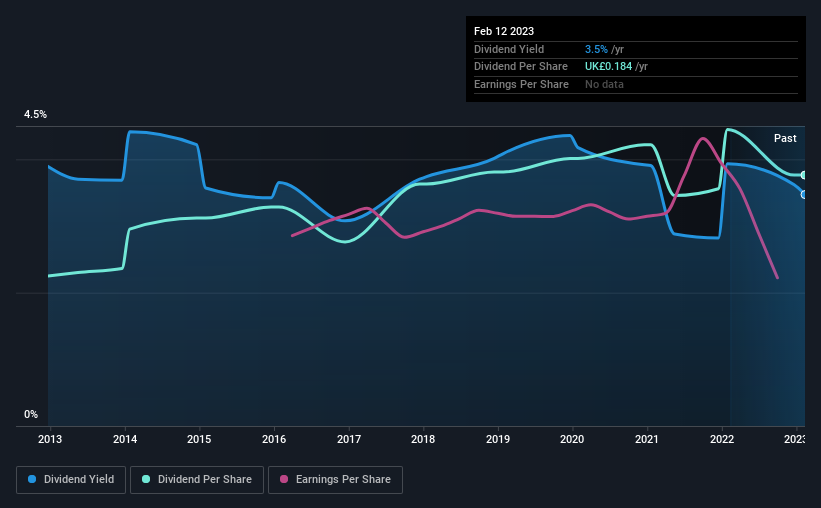- United Kingdom
- /
- Electric Utilities
- /
- LSE:JEL
It Might Not Be A Great Idea To Buy Jersey Electricity plc (LON:JEL) For Its Next Dividend

Jersey Electricity plc (LON:JEL) stock is about to trade ex-dividend in three days. The ex-dividend date is one business day before the record date, which is the cut-off date for shareholders to be present on the company's books to be eligible for a dividend payment. The ex-dividend date is of consequence because whenever a stock is bought or sold, the trade takes at least two business day to settle. This means that investors who purchase Jersey Electricity's shares on or after the 16th of February will not receive the dividend, which will be paid on the 23rd of March.
The company's next dividend payment will be UK£0.11 per share, and in the last 12 months, the company paid a total of UK£0.18 per share. Based on the last year's worth of payments, Jersey Electricity stock has a trailing yield of around 3.5% on the current share price of £5.3. We love seeing companies pay a dividend, but it's also important to be sure that laying the golden eggs isn't going to kill our golden goose! So we need to check whether the dividend payments are covered, and if earnings are growing.
View our latest analysis for Jersey Electricity
If a company pays out more in dividends than it earned, then the dividend might become unsustainable - hardly an ideal situation. Its dividend payout ratio is 85% of profit, which means the company is paying out a majority of its earnings. The relatively limited profit reinvestment could slow the rate of future earnings growth. We'd be concerned if earnings began to decline. A useful secondary check can be to evaluate whether Jersey Electricity generated enough free cash flow to afford its dividend. Over the last year it paid out 55% of its free cash flow as dividends, within the usual range for most companies.
It's positive to see that Jersey Electricity's dividend is covered by both profits and cash flow, since this is generally a sign that the dividend is sustainable, and a lower payout ratio usually suggests a greater margin of safety before the dividend gets cut.
Click here to see how much of its profit Jersey Electricity paid out over the last 12 months.

Have Earnings And Dividends Been Growing?
Businesses with shrinking earnings are tricky from a dividend perspective. If earnings fall far enough, the company could be forced to cut its dividend. So we're not too excited that Jersey Electricity's earnings are down 4.7% a year over the past five years.
Many investors will assess a company's dividend performance by evaluating how much the dividend payments have changed over time. Jersey Electricity has delivered 5.3% dividend growth per year on average over the past 10 years. The only way to pay higher dividends when earnings are shrinking is either to pay out a larger percentage of profits, spend cash from the balance sheet, or borrow the money. Jersey Electricity is already paying out a high percentage of its income, so without earnings growth, we're doubtful of whether this dividend will grow much in the future.
The Bottom Line
From a dividend perspective, should investors buy or avoid Jersey Electricity? While earnings per share are shrinking, it's encouraging to see that at least Jersey Electricity's dividend appears sustainable, with earnings and cashflow payout ratios that are within reasonable bounds. With the way things are shaping up from a dividend perspective, we'd be inclined to steer clear of Jersey Electricity.
Having said that, if you're looking at this stock without much concern for the dividend, you should still be familiar of the risks involved with Jersey Electricity. Every company has risks, and we've spotted 2 warning signs for Jersey Electricity you should know about.
Generally, we wouldn't recommend just buying the first dividend stock you see. Here's a curated list of interesting stocks that are strong dividend payers.
If you're looking to trade Jersey Electricity, open an account with the lowest-cost platform trusted by professionals, Interactive Brokers.
With clients in over 200 countries and territories, and access to 160 markets, IBKR lets you trade stocks, options, futures, forex, bonds and funds from a single integrated account.
Enjoy no hidden fees, no account minimums, and FX conversion rates as low as 0.03%, far better than what most brokers offer.
Sponsored ContentNew: Manage All Your Stock Portfolios in One Place
We've created the ultimate portfolio companion for stock investors, and it's free.
• Connect an unlimited number of Portfolios and see your total in one currency
• Be alerted to new Warning Signs or Risks via email or mobile
• Track the Fair Value of your stocks
Have feedback on this article? Concerned about the content? Get in touch with us directly. Alternatively, email editorial-team (at) simplywallst.com.
This article by Simply Wall St is general in nature. We provide commentary based on historical data and analyst forecasts only using an unbiased methodology and our articles are not intended to be financial advice. It does not constitute a recommendation to buy or sell any stock, and does not take account of your objectives, or your financial situation. We aim to bring you long-term focused analysis driven by fundamental data. Note that our analysis may not factor in the latest price-sensitive company announcements or qualitative material. Simply Wall St has no position in any stocks mentioned.
About LSE:JEL
Jersey Electricity
Engages in the generation, transmission, distribution, and supply of electricity in Jersey.
Excellent balance sheet and good value.
Market Insights
Community Narratives



